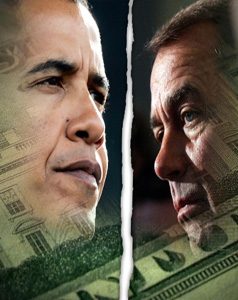 Finally, the negotiations over the “fiscal cliff” begin.
Finally, the negotiations over the “fiscal cliff” begin.
President Obama and congressional leaders are scheduled to meet for the first time Friday morning since the election and begin talks about how to resolve the year-end fiscal cliff. They have 46 days before deep federal spending cuts and dramatic tax hikes on nearly all Americans take effect, likely pushing the economy into recession.
The 10:15 a.m. meeting comes after more than a week of positioning by Obama and the leading lawmakers, including House Speaker John Boehner (R-Ohio), House Minority Leader Nancy Pelosi (D-Calif.), Senate Majority Leader Harry Reid (D-Nev.) and Senate Minority Leader Mitch McConnell (R-Ky.).
The key point of division between Obama and the Republicans is taxes, and both sides have already made their opening bids.
Obama wants to freeze tax rates for all families earning less than $250,000 a year and allow the George W. Bush-era tax rates to expire, as scheduled, for wealthier Americans.
“This would not only give certainty to millions of American families and small businesses but also resolve more than half of the impact of the so-called fiscal cliff,” a White House official said in a statement. “[Obama] will be making clear that he is willing to compromise and do tough things to get this done, but only in the context of a balanced approach that also asks more in revenues from the wealthiest Americans.”
Republicans say they are open to raising taxes. But they insist they will not allow tax rates to increase. Instead, they say new tax revenue must be found by limiting deductions that benefit the wealthy and from economic growth.
The meeting recalls a furious series of negotiations in spring and summer of 2011 over a deal to tame the debt — talks that ultimately failed and created the conditions that have led to the fiscal cliff. But this time may be different. Obama feels empowered by what Democrats say is a resounding electoral victory — based in part on an explicit call to tax the rich more heavily.
Republicans, meanwhile, are increasingly willing to break with orthodoxy and accept tax increases. They are being pushed in that direction not only by the electoral defeat but also by events since — including former GOP presidential nominee Mitt Romney’s comments Wednesday that Obama won the election because he gave “gifts” to his constituents, a position many in the GOP have repudiated.
Tax rates on the wealthy are set to rise from 35 percent to 39.6 percent in the new year, raising about $850 billion over the next decade. While Obama says he is not wedded to his plan, the White House has made clear that simply limiting deductions would not be an acceptable approach. But the White House has not drawn what Obama termed “red lines” and may be open to accepting a somewhat more modest increase in tax rates, if accompanied by a promise to raise even more tax revenue through limits on deductions and other measures.
If Republicans ultimately accept that compromise, the fiscal cliff — which would suck $500 billion out of the economy next year alone — could be averted. But if Republicans hold the line against higher tax rates, Obama has suggested he would be willing to go over the cliff.
In any deal, Republicans will also probably insist on significant changes in entitlement programs such as Medicare and Social Security. Obama has refused to rule out such changes. In secret talks with Boehner last year, Obama was willing to accept two big reforms: raising the Medicare eligibility age from 65 to 67 and offering stingier cost-of-living increases in Social Security.
Obama says that to achieve a deal that would ultimately tame the debt, even more tax revenue would be needed than just allowing tax cuts for upper-income earners to expire. He will argue for $1.6 trillion in new taxes — generated by hiking tax rates on the wealthy, limiting deductions for upper-income earners and companies and a special tax on millionaires. Republicans are unlikely to go along with such a pact. It is double what Boehner was prepared to accept in last year’s talks with Obama.
Borrowing must decline by about $4 trillion over the next decade to stabilize the government debt, which is at its largest size, as a percentage of the economy, since the period right after World War II. Already in place are spending cuts worth $1.1 trillion over the next decade. About another $1 trillion in savings is expected with the end of the wars in Iraq and Afghanistan.
The Senate is already largely on board with a deal. The chamber is not only controlled by Democrats, but also has a larger number of Republicans who appear willing to accept higher taxes. That is one reason some are hoping that, if Obama and Boehner aren’t able to find common ground, the Senate could provide a path to a deal.
After Friday’s meeting, Obama leaves for three days on a trip to Asia. He may meet again next week with lawmakers before the Thanksgiving holiday. Negotiations are likely to intensify in the last week of November and the first weeks of December. In order to correctly publish tax tables for the new year, the Internal Revenue Service will need Congress to make final decisions on 2013 tax policy by the middle to end of December.